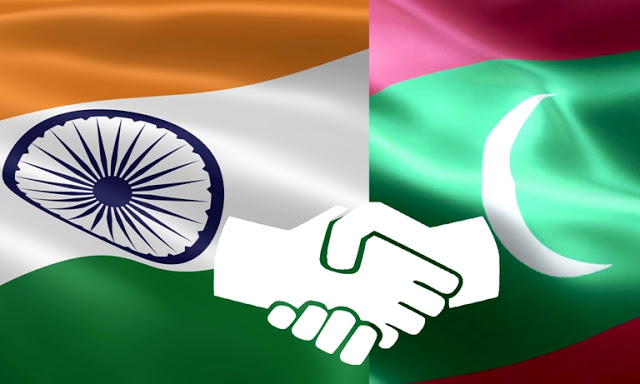Table of Contents
Conflict between India- Maldives Relations
Cooperation between India-Maldives
- Geo-strategic cooperation
- Both are partners in Important regional (like SAARC AND SASEC) and international groupings (Various UN organizations and other groupings).
- Maldives is an important part of India’s Neighbourhood-first policy and its aspiration to become a dominant global player in world affairs.
- Similarly, Maldives also follows the ‘India first policy’, showing the importance of India in its
- Tollgate in the Indian Ocean region (IOC): Given the strategic location of the Maldives, it acts as a toll gate in the IOC, hence very important for securing India’s geostrategic and economic interests.
- Nearly 50% of India’s external trade and 80% of its energy imports transit these sea lanes of communications (SLOCs) in the Arabian Sea.
- Economic cooperation:
- Tourism sector: contributes to a major portion of Maldive’s economy. In this context, a large portion of tourists are from India, hence boosting the Maldives economy.
- Indian citizens participate in the Maldivian workforce and contribute to the economy.
- Medical tourism: From Maldives to India, especially in the super-speciality healthcare sector due to the liberal visa regime offered by India.
- Defence cooperation:
- Training of Maldivian National Defence Force (MNDF): provided by India, meeting around 70% of their defence training requirements.
- Operation Cactus, 1988: India deployed its military at the request of the Maldives government to successfully thwart a coup attempt by rebels.
- ‘Ekuverin’: a joint military exercise between India and Maldives.
- India as a ‘Net Security Provider’ in the region: Maldives is a very important part of many Indian initiatives like the SAGAR initiative, Mausam Initiative, etc. directed towards achieving its goal of becoming a net security provider in the region.
- Cultural affinity: People from both countries share many common traditions, cultural practices and religious beliefs, helping people to connect.
- India provides opportunities to students from Maldives in its various prestigious education institutions.
- Disaster Management:
- Tsunami 2004: India was the first country to respond to help Maldives counter this disaster.
- Operation NEER: Under it, India immediately rushed bottled drinking water to Malé utilising Air Force aircraft and Navy ships during the 2014 male water crisis.
- COVID-19 Crisis: India provided essential medical supplies during times of need and later also supplied Vaccines under its Vaccine Maitri Initiative.
Friction areas in the India- Maldives relation
- India Out campaign: by the opposition party (under previous president Abdulla Yameen) against New Delhi’s massive developmental funding for creating physical, social and community infrastructure in Maldives.
- Frequent political instability and opposition parties playing the India card: to win political brownie points in the elections, could cause damage to India’s interests in the region.
- China factor: The rising influence of China in the Indian Ocean region is a matter of concern for India. In this context, China’s growing presence in the Maldives threatens India’s geo-political interests in the region.
- The Maldives has emerged as an important ‘pearl’ in China’s “String of Pearls” construct in South Asia.
- Terrorism and Radicalization of Youth: Growing radicalization in the world has also affected the youths of the Maldives. There have been growing instances of Maldivian nationals joining ISIS and Pakistan-based madrassas and jihadist groups.
- Socio-economic uncertainty in the backdrop of political instability: has acted as fuel for disheartened youth and driven them towards terrorist activities.
Way forward
- Continuing to follow a non-interference policy in internal matters: like it did in the previous presidential election, will help in further strengthening trust among the people of Maldives towards India.
- Cooperate on global issues: Issues like Climate Change, of which both Maldives and India are facing major existential challenges and Terrorism which threatens internal peace and security. On such issues, both countries should continue to work together to ensure a peaceful and sustainable future.
- India should continue to work for a more prosperous, stable, peaceful and sustainable Maldives.
- The use of diaspora and cultural aspects: like films, music, and people-to-people contacts should be employed by India to strengthen its relations with.




 TSPSC Group 1 Question Paper 2024, Downl...
TSPSC Group 1 Question Paper 2024, Downl...
 TSPSC Group 1 Answer key 2024 Out, Downl...
TSPSC Group 1 Answer key 2024 Out, Downl...
 UPSC Prelims 2024 Question Paper, Downlo...
UPSC Prelims 2024 Question Paper, Downlo...





